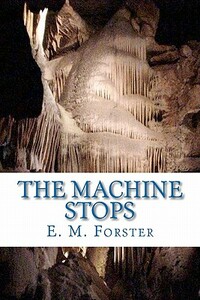Take a photo of a barcode or cover
Written as a rebuttal to the positive view of the advancement of technology portrayed in many of H.G. Wells’s novels, this short story predicts so much of our modern world in a horrifying fashion.
A good Dystopian story.
A good Dystopian story.
challenging
slow-paced
Plot or Character Driven:
Plot
Strong character development:
No
Loveable characters:
No
Diverse cast of characters:
No
Flaws of characters a main focus:
Complicated
This story was mentioned in Code Dependent: Living in the Shadow of AI by Madhumita Murgia, and it sounded so fascinating that it made me want to read it. It really is mindblowing the way in which Forster's vision ended up predicting so many current technologies, as well as the effects they would have on us, and offering a bleak - but not at all laughable, all things considered - future for humanity.
However, as a story, I found the writing style a slog and it was hard to stay engaged - it actually took me over a month to finish reading it.
However, as a story, I found the writing style a slog and it was hard to stay engaged - it actually took me over a month to finish reading it.
dark
emotional
mysterious
reflective
sad
fast-paced
Plot or Character Driven:
A mix
Strong character development:
Complicated
Loveable characters:
Complicated
Diverse cast of characters:
No
Flaws of characters a main focus:
Yes
This was written in 1909, before AI was invented. Reading this in 2025 made me feel a sense of dread. We're already beginning to see people's overreliance on AI - People go to Chatgpt for ideas, writing, doing their work for them... As AI is developing it makes you wonder whether humans will enter a lifestyle like that of this book. What if the machine represents AI?. This book is short but poignant. It certainly is dark and bleak. But, it's incredible - particularly when you think that it was written a century ago.
I came across E. M. Forster’s novella, “The Machine Stops,” while looking for short titles my library could offer to help achieve my 2020 reading goal.
“A Room With A View” is in my top 50 books and was published in 1908, one year before “The Machine Stops.” In 1910, Forster published “Howard’s End.” This novella, one of a future time and which humanity is generally isolated physically, while being connected via something like the Internet, lives underground after prior generations had contaminated the planet’s upper surface. Forster’s vision of the world in this book is all-too-familiar to those of us in pandemic 2020.
A major theme in this forward-looking work is humanism. Humans become reliant on and then deify The Machine, going so far as to forget that The Machine was created by man and eventually stops because man has forgotten how to tend to it. At its heart, characters like Kuno, who question single-/close-minded worship and who value personal connections, are the heroes.
It was very interesting to read this book not long after H. G. Wells’ “The Time Machine;” some of the themes around colonialism, class, and humanism up here and both books, although in different ways.
“A Room With A View” is in my top 50 books and was published in 1908, one year before “The Machine Stops.” In 1910, Forster published “Howard’s End.” This novella, one of a future time and which humanity is generally isolated physically, while being connected via something like the Internet, lives underground after prior generations had contaminated the planet’s upper surface. Forster’s vision of the world in this book is all-too-familiar to those of us in pandemic 2020.
A major theme in this forward-looking work is humanism. Humans become reliant on and then deify The Machine, going so far as to forget that The Machine was created by man and eventually stops because man has forgotten how to tend to it. At its heart, characters like Kuno, who question single-/close-minded worship and who value personal connections, are the heroes.
It was very interesting to read this book not long after H. G. Wells’ “The Time Machine;” some of the themes around colonialism, class, and humanism up here and both books, although in different ways.
Awesome that it's so old, difficult to actually enjoy. Worth reading for historical interest.
reflective
sad
tense
fast-paced
Plot or Character Driven:
Plot
Strong character development:
No
Loveable characters:
No
Diverse cast of characters:
No
Flaws of characters a main focus:
Yes
Een science fiction verhaal uit 1909(!) dat gaat over internet, social media en de lockdown. Daarnaast gaf het me een wijsheid die ik niet eerder had gehoord: God heeft de mens niet naar zijn evenbeeld geschapen maar andersom.
Demorei imenso tempo a ler isto, mas gostei
Sinto que é daqueles livros para reler daqui a uns anos.
Sinto que é daqueles livros para reler daqui a uns anos.
I bought this little book in a science fiction and fantasy bookshop in Edinburgh, having not realised that Forster wrote Sci-Fi. It is quite spooky how close his imagining of the future is to our present; really very close. Forster clearly saw what might be lost with the rise of the machine, and it is a warning we should still heed today. There is a second story in the book, called The Celestial Omnibus, which reminded me of C.S. Lewis, in a way; a reminder to experience child like joy in literature.



